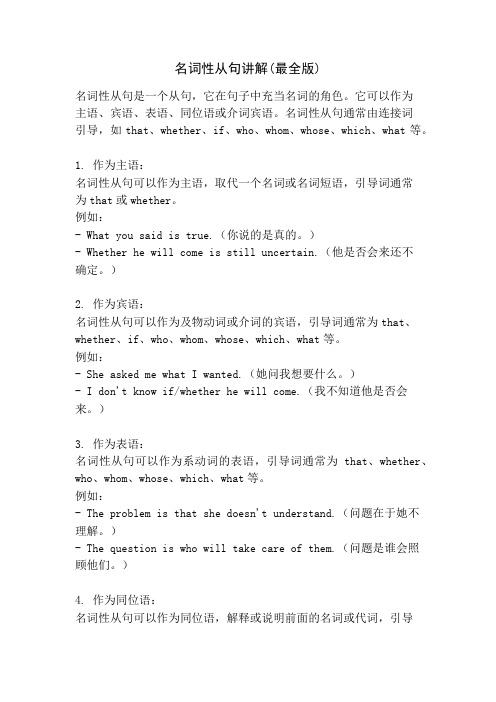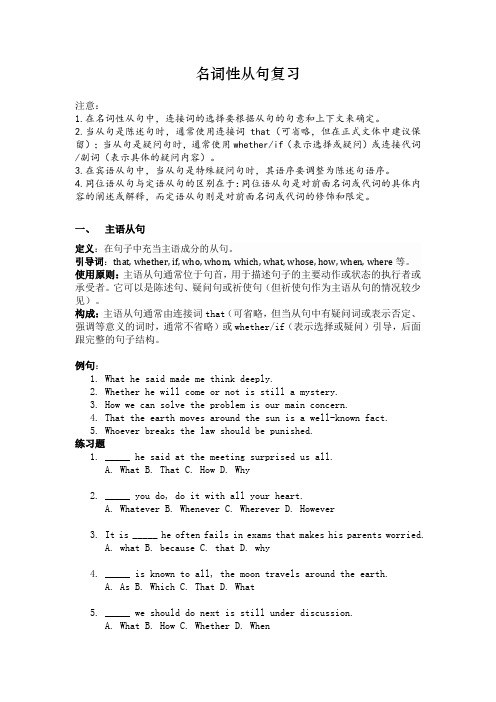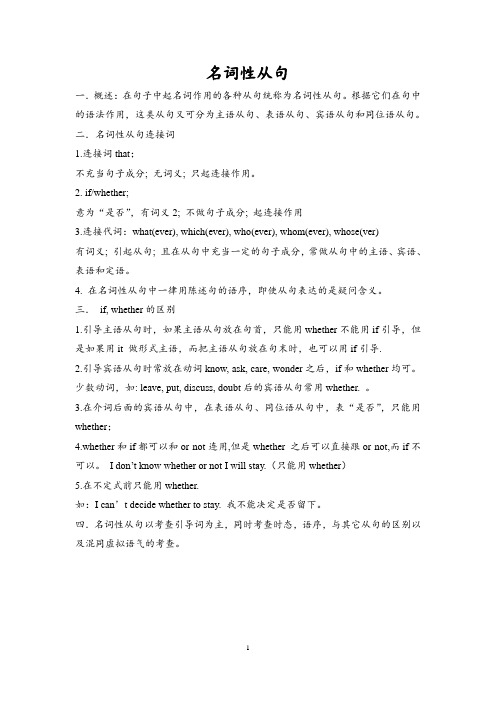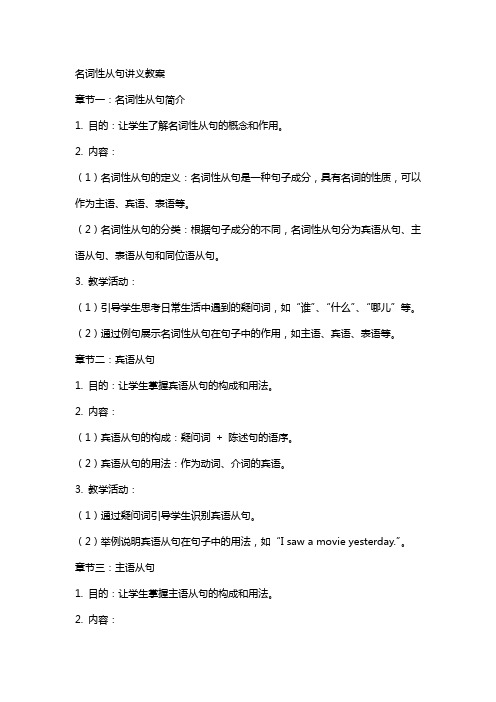名词从句讲义
名词性从句讲解(最全版)

名词性从句讲解(最全版)名词性从句是一个从句,它在句子中充当名词的角色。
它可以作为主语、宾语、表语、同位语或介词宾语。
名词性从句通常由连接词引导,如that、whether、if、who、whom、whose、which、what等。
1. 作为主语:名词性从句可以作为主语,取代一个名词或名词短语,引导词通常为that或whether。
例如:- What you said is true.(你说的是真的。
)- Whether he will come is still uncertain.(他是否会来还不确定。
)2. 作为宾语:名词性从句可以作为及物动词或介词的宾语,引导词通常为that、whether、if、who、whom、whose、which、what等。
例如:- She asked me what I wanted.(她问我想要什么。
)- I don't know if/whether he will come.(我不知道他是否会来。
)3. 作为表语:名词性从句可以作为系动词的表语,引导词通常为that、whether、who、whom、whose、which、what等。
例如:- The problem is that she doesn't understand.(问题在于她不理解。
)- The question is who will take care of them.(问题是谁会照顾他们。
)4. 作为同位语:名词性从句可以作为同位语,解释或说明前面的名词或代词,引导词通常为that、whether、who、whom、whose、which、what等。
例如:- The fact that he lied surprised me.(他撒谎的事实让我感到惊讶。
)- His belief that she will succeed is unwavering.(他坚信她会成功。
名词性从句复习讲义 高三英语一轮复习

名词性从句复习注意:1.在名词性从句中,连接词的选择要根据从句的句意和上下文来确定。
2.当从句是陈述句时,通常使用连接词that(可省略,但在正式文体中建议保留);当从句是疑问句时,通常使用whether/if(表示选择或疑问)或连接代词/副词(表示具体的疑问内容)。
3.在宾语从句中,当从句是特殊疑问句时,其语序要调整为陈述句语序。
4.同位语从句与定语从句的区别在于:同位语从句是对前面名词或代词的具体内容的阐述或解释,而定语从句则是对前面名词或代词的修饰和限定。
一、主语从句定义:在句子中充当主语成分的从句。
引导词:that, whether, if, who, whom, which, what, whose, how, when, where等。
使用原则:主语从句通常位于句首,用于描述句子的主要动作或状态的执行者或承受者。
它可以是陈述句、疑问句或祈使句(但祈使句作为主语从句的情况较少见)。
构成:主语从句通常由连接词that(可省略,但当从句中有疑问词或表示否定、强调等意义的词时,通常不省略)或whether/if(表示选择或疑问)引导,后面跟完整的句子结构。
例句:1.What he said made me think deeply.2.Whether he will come or not is still a mystery.3.How we can solve the problem is our main concern.4.That the earth moves around the sun is a well-known fact.5.Whoever breaks the law should be punished.练习题1._____ he said at the meeting surprised us all.A. WhatB. ThatC. HowD. Why2._____ you do, do it with all your heart.A. WhateverB. WheneverC. WhereverD. However3.It is _____ he often fails in exams that makes his parents worried.A. whatB. becauseC. thatD. why4._____ is known to all, the moon travels around the earth.A. AsB. WhichC. ThatD. What5._____ we should do next is still under discussion.A. WhatB. HowC. WhetherD. When答案:AAC(强调句结构)AA二、宾语从句定义:在句子中充当宾语成分的从句。
名词性从句讲义1

名词性从句讲义一. 名词性从句在句子中起名词性作用的从句叫做名词性从句(Noun Clauses). 名词性从句在句中的作用相当于名词或名词短语, 在复合句中担当主语, 宾语, 表语和同位语等. 因此根据它在句中不同的语法功能可分为: 主语从句, 宾语从句, 表语从句和同位语从句.引导名词性从句的连接词可分为三种:连接词: that, whether, if (不在从句中做任何成分)连接代词: what, who, whom, which, whose和wh+ever (通常在从句中做主语,宾语,表语等) 连接副词: when, where, why, how以及wh/h+ever(通常在从句中做状语)二.主语从句1.概念: 主语从句是在复合句中充当主语的从句.2.连接词:that只起连接主句和从句的作用,在从句中不担任任何成分,本身没有词义,不可省略whether 连接主句和从句, 在从句中不担任任何成分, 但本身有选择或是否的含义whether与if 区别〔一〕引导宾语从句,一般既可用whether 也可用if。
但1 or not放在whether之后时,只能用whether 不用if。
I don’t know whether or not he will come. 我不知道他是不是回来。
注1:如果or not放在whether所引导的从句句尾,那么可以用if来替换。
I don’t know whether/if he will come or not.我不知道他是不是回来。
2 在强调任意选择时,用whether…or,此时不用if替换whether。
He asked me whether I wanted to go there by train or by bus.他问我是想乘火车还是坐公共汽车去那里。
注:whether和or一起还有“不管〞之意,引导让步状语从句。
Whether he drives or takes the train, he will be here on time.不管开车来还是乘火车来,他都会准时到。
高中英语名词性从句讲义(超详细版)

名词性从句一.定义:在句子中起名词作用的句子叫名词性从句 (Noun Clauses)。
名词性从句的功能相当于名词词组, 它在复合句中能担任主语、宾语、表语、同位语、介词宾语等,因此根据它在句中不同的语法功能,名词性从句又可分别称为主语从句、宾语从句、表语从句和同位语从句。
1. His words are true. What he said is true.2. The dog sensed something good. The dog sensed that there was something good nearby.3. These are his words. These are what he said.4. My Maths teacher, Mr He, is a kind person. The news that the plane had crashed made us sad.二.引导名词性从句的连接词连词:在从句中不充当成分,只起连接作用 that, 无实义whether, if 是否as if \ as though 似乎,好像连接代词:有词义,在句中担任主语,表语,定语或宾语。
what, 什么 who, 谁whom, 谁,作宾语 whose, 谁的 which, 哪一个whatever, whoever……也可以引导。
连接副词:有词义,在句中担任状语。
when ,什么时候 where, 什么地方 why, 为什么 how ,怎么样how many, how much, how often三.主语从句1. 作句子主语的从句叫主语从句。
What he wants to tell us is not clear. 他要跟我们说什么,还不清楚。
It is known to us how he became a writer. 我们都知道他是如何成为一名作家的。
That he is late for school makes the teacher very angry. 他上学迟到让老师很生气。
名词性从句讲义-高三英语一轮复习

一.概念:名词性从句就相当于一个名词(因为名词可以充当主语,宾语和表语,所以名词性从句包含主语从句,宾语从句和表语从句和同位语从句)二.名词性从句主语从句That she is beautiful is a fact.主语从句系定表宾语从句We know that she is beautiful.主谓宾语从句表语从句 Our opinion is that she is beautiful.主系表语从句同位语从句The opinion that she is beautiful is a fact.主同位语从句系定表三.名词性从句的格式 1. that+陈述句=名词宾1.结构:主语 + 谓语2.语序:陈述句语序3.连接词 :①由that 引导②由if /whether 引导know if / whether Hua likes fish.③由特殊疑问词引导,表示特殊疑问意义 I want to know what time it is now.4.时态①当主句是一般现在时,从句根据情况使用任何时态。
(即:主现从不限)I don’t know (that) she is singing now.②当主句是一般过去时,从句应使用过去某时态(一般过去时,过去进行时,过去将来时,过去完成时)。
He said (that) he was at home. 他说他在家里。
③主句使用一般过去时,但从句表示的是客观真理、自然现象时、从句仍用一般现在时。
The teacher told us light travels faster than sound.一、一般结构:主语+连系动词+表语从句,二、可以接表语从句的词有:①be(being, been, am ,is, are, was, were)(be动词)② feel,look,sound, taste, smell (感官动词)③ stand, lie,remain, keep, stay(保持动词)④bee, get, grow, turn ,go ,prove(变化动词)⑤ seem, appear(表象动词)三、公式:a.由连接词that(无意义), whether(是否)引导的表语从句这时主句的主语常常是抽象名词,如problem, result, chance, suggestion, question, reason 等,表语从句对主句主语进行说明,解释等。
高中名词性从句讲义

名词性从句一.概述:在句子中起名词作用的各种从句统称为名词性从句。
根据它们在句中的语法作用,这类从句又可分为主语从句、表语从句、宾语从句和同位语从句。
二.名词性从句连接词1.连接词that;不充当句子成分; 无词义; 只起连接作用。
2. if/whether;意为“是否”,有词义2; 不做句子成分; 起连接作用3.连接代词:what(ever), which(ever), who(ever), whom(ever), whose(ver)有词义; 引起从句; 且在从句中充当一定的句子成分,常做从句中的主语、宾语、表语和定语。
4. 在名词性从句中一律用陈述句的语序,即使从句表达的是疑问含义。
三.if, whether的区别1.引导主语从句时,如果主语从句放在句首,只能用whether不能用if引导,但是如果用it 做形式主语,而把主语从句放在句末时,也可以用if引导.2.引导宾语从句时常放在动词know, ask, care, wonder之后,if和whether均可。
少数动词,如: leave, put, discuss, doubt后的宾语从句常用whether. 。
3.在介词后面的宾语从句中,在表语从句、同位语从句中,表“是否”,只能用whether;4.whether和if都可以和or not连用,但是whether 之后可以直接跟or not,而if不可以。
I don’t know whether or not I will stay.(只能用whether)5.在不定式前只能用whether.如:I can’t decide whether to stay. 我不能决定是否留下。
四.名词性从句以考查引导词为主,同时考查时态,语序,与其它从句的区别以及混同虚拟语气的考查。
一.主语从句1.主语从句定义:在复合句中充当主语的句子叫做主语从句。
That he will succeed is certain.Whether wild life can be well protected is of great importance.Who will go makes no different.Which kind of food is the best is still not certain.What is needed for the space trip is careful preparation.Whoever comes is welcome.How we can help the twins will be discussed at the meeting.When they’ll start the project has not been decided yet.Where he hid the money is to be found out.Why dinosaurs died out remains a puzzle.单个主语从句作主语时,谓语动词用单数形式。
名词性从句讲义教案

名词性从句讲义教案章节一:名词性从句简介1. 目的:让学生了解名词性从句的概念和作用。
2. 内容:(1)名词性从句的定义:名词性从句是一种句子成分,具有名词的性质,可以作为主语、宾语、表语等。
(2)名词性从句的分类:根据句子成分的不同,名词性从句分为宾语从句、主语从句、表语从句和同位语从句。
3. 教学活动:(1)引导学生思考日常生活中遇到的疑问词,如“谁”、“什么”、“哪儿”等。
(2)通过例句展示名词性从句在句子中的作用,如主语、宾语、表语等。
章节二:宾语从句1. 目的:让学生掌握宾语从句的构成和用法。
2. 内容:(1)宾语从句的构成:疑问词+ 陈述句的语序。
(2)宾语从句的用法:作为动词、介词的宾语。
3. 教学活动:(1)通过疑问词引导学生识别宾语从句。
(2)举例说明宾语从句在句子中的用法,如“I saw a movie yesterday.”。
章节三:主语从句1. 目的:让学生掌握主语从句的构成和用法。
2. 内容:(1)主语从句的构成:疑问词+ 陈述句的语序。
(2)主语从句的用法:作为主语,表示话题或陈述对象。
3. 教学活动:(1)通过疑问词引导学生识别主语从句。
(2)举例说明主语从句在句子中的用法,如“That she is ing is good news.”。
章节四:表语从句1. 目的:让学生掌握表语从句的构成和用法。
2. 内容:(1)表语从句的构成:疑问词+ 陈述句的语序。
(2)表语从句的用法:作为表语,补充说明主语的内容。
3. 教学活动:(1)通过疑问词引导学生识别表语从句。
(2)举例说明表语从句在句子中的用法,如“The problem is that we don't have enough time.”。
章节五:同位语从句1. 目的:让学生掌握同位语从句的构成和用法。
2. 内容:(1)同位语从句的构成:疑问词+ 陈述句的语序。
(2)同位语从句的用法:与前面的名词或代词共同作主语、宾语或表语,起到解释说明的作用。
英语名词性从句讲解【完整版】

2、I asked him if he could do me a favor .
If与whether的区别:
1、If不能引导放于句首的主语从句,而whether可以。 2、引导表语从句用whether,不用if。 3、引导同位语从句用whether,不用if。 4、whether可以引导从句作介词的宾语,不用if 。 5、whether or not 连在一起可以,但if不可以。而 “whether-----or not = if -----or not”
同位语从句:
定义:在复合句中充当同位语的句子。 同位语从句用来对其前面的抽象名词进行解释说明,被解释说明的词和 同位语在逻辑上是主表关系。 同位语常见名词:fact, suggestion, advice, idea, decision, news, thought, hope, belief, truth, doubt, promise, possibility, truth, warning, message, reason, report, question,explanation, wish, problem等。 常见的连接词:that, whether, what, who, how, when, where等。 用法: The thought that I want to buy my mother a birthday gift makes me excited.that 引导的同位语从句,解释说明 thought,从句不缺成 分 There is some doubt whether he will come. whether 引导同位语从句,if 不能引导同位语从句 we haven’t made the decision where we are going to spend our vacation. 有时同位语从句可以不紧跟解释说明的名词后面。 The news is surprising that he won the match.
- 1、下载文档前请自行甄别文档内容的完整性,平台不提供额外的编辑、内容补充、找答案等附加服务。
- 2、"仅部分预览"的文档,不可在线预览部分如存在完整性等问题,可反馈申请退款(可完整预览的文档不适用该条件!)。
- 3、如文档侵犯您的权益,请联系客服反馈,我们会尽快为您处理(人工客服工作时间:9:00-18:30)。
第四讲名词性从句一、知识点拨(一)宾语从句(Object Clause)同学们在初中阶段时就开始接触宾语从句了。
当将一个直接引语转为间接引语时,就是在构造一个与“说”相关的动词后的宾语从句了。
在直接引语向间接引语转化的过程中,应就不同的句型类别进行不同的处理。
而不同的句型类别都应根据转述者和转述时间对宾语从句中的人称、时态及状语作相应的调整。
1.陈述句: 不需调整语序,只要对人称,时态或状语作一定的变化即可。
通常,若主句中的动词为过去时,则从句中的时态也要相应后退一格。
但如从句部分是客观真理,时态则务须变化。
如:①When the fox could not reach the grapes, he said, “The grapes are sour.”→ When the fox could not reach the grapes, he said that the grapes were sour.②She said, “Necessity is the mother of invention”→She said that necessity is the mother of invention.2.疑问句:可分为一般疑问句和特殊疑问句两类。
⑴一般疑问句: 转为if 或whether(是否)引导的宾语从句,且调整为陈述句语序,即主谓宾的顺序。
有时可用或whether … or not的结构。
如:“Do you want to insure your luggage or not?” he asked.⑵但当疑问词即是句子中的主语,则无需变换语序。
如:①“How are you getting along with your English study?” asked John.→ John asked me how I was getting along with my English study.②He asked, “What caused the accident?” → He asked what had caused the accident.3.祈使句: 可不再转为宾语从句,而是用“命令性动词+ 人称代词(宾格)/名词+ 不定式”的结构来表达相近的意思。
如:I said, “Keep a record of your expenses.”→4.”的结构。
如:She exclaimed, “What a silly boy you are!”→She told him what a silly boy he was.5.特殊结构:可根据句子的意思作灵活的变通。
如:①“You had better not leave your car unlocked,” said my friends, “there has been a lot ofstealing from cars.”→ My friends warned me not to leave my car unlocked as there had been a lot of stealing from cars.②British poet P.B.Shelly said, “If winter comes, can spring be far behind?”→British poet P.B.Shelly said that spring can’t be far behind if winter came.掌握了与“说”相关的动词后的宾语从句的构成,其它动词后的宾语从句也就不难理解了。
须注意两类动词:1. 表示说话者认知的动词:know, believe, think, explain, guess, hope, agree, understand, realize,suppose, expect 等动词后既可以跟that 引导的陈述分句作宾语,that常被省略;又可以跟疑问分句。
如:①One should know what’s what.② A straw shows which way the wind blows.值得注意的是:⑴有些表示猜想的动词后的从句中的否定式通常前移至主句中。
如:I don’t think he can do it better than me.⑵反意疑问句通常是对复合句中的主句发问,但若主句为I think/believe/suppose时, 则对从句发问。
如:We never thought she would play so well in the match, had we?I think you’ll come to the meeting, won’t you?⑶回答对think,believe,guess,hope等词提问的一般疑问句时,可用缩略式,即肯定回答用so;否定回答用not或don’t …so。
其中hope的否定回答只能用not。
如:Do you think / hope / guess / believe he will treat the child like that?Yes, I think / hope / guess / believe so.= Yes, I think / hope / guess / believe (that) he will treat the child like that.No, I don’t think / believe / suppose so.= No, I don’t think / believe / suppose (that) he will treat the child like that.No, I hope / believe / guess not.= No, I hope / believe / guess (that) he will treat the child like that.⑷wonder (想知道), doubt (怀疑)等动词本身带有不确定性,故后面多跟疑问分句。
注意,doubt在肯定句中,后接if或whether引导的宾语从句;在否定句和疑问句中后接that引导的宾语从句。
如:①I wonder who he is.②I doubt if / whether she is so vain and ignorant.I don’t doubt (that) she is so vain and ignorant.2. 表达说话者强烈意愿的动词:其后所跟的宾语从句须用虚拟语气。
⑴suggest,advise,order,demand,insist等动词后用“(that) … should do …”的结构,此时should可被省去。
如:Let us suggest to the person in crisis that he (should) cease concentrating so upon the dangers involved and the difficulties, and concentrate instead upon the opportunity- for there is always opportunity in crisis.⑵动词wish后的宾语从句多为不可能实现的愿望,故常将时态后退一格以示虚拟。
如:①I wish that all men everywhere could be free.②I wish she had taken my advice.3.⑴有些动词后带有宾语从句作为其直接宾语,同时带有一个人称代词或名词作为其间接宾语。
如:①He has informed me when they are to discuss my proposal.②She promised us that she would give us more help later on.③The company explained to their employees that a pay rise was out of the question.⑵在含有复合宾语“动词+ 宾语从句+ 宾语补足语”的结构中,往往因为宾语从句过长而将其放到句末,同时用it来充当形式宾语。
如:①We consider it absolutely necessary that we should open our door to the outside world.②I find it strange that he has not come yet.③He has made it clear that he won’t agree to the plan..④I heard it said that she had gone abroad.1.that引导的宾语从句一般不能直接跟在介词后面。
但须注意的是:⑴介词except,but,in后面可跟that引导的宾语从句。
如:①He is a capable man except that he has not enough experience.②I would come to see you but that I had something urgent to do then.③The higher income tax is harmful in that it may discourage people from trying to earnmore.⑵在有些含有介词的短语后可加上形式宾语it,再跟上that引导的宾语从句,形成depend on it that,rely on it that,insist on it that,see to it that等结构。
如:①I shall see to it that he is taken good care of when you are absent.②You can depend on it that I will try my best to get good grades at school.2.wh-词引导的宾语从句可以充当介词的宾语。
如:①We were astonished by what they found.②I walked over to where she sat.③I’m concerned about whether he has signed the contract or not.④I’m interested in when he did it.形容词后的名词性从句也被称作形容词补足语,多用于certain, sure, unaware, glad, afraid, frightened, happy, pleased, sad, sorry, surprised, upset 等表示认知或情感的形容词后。
